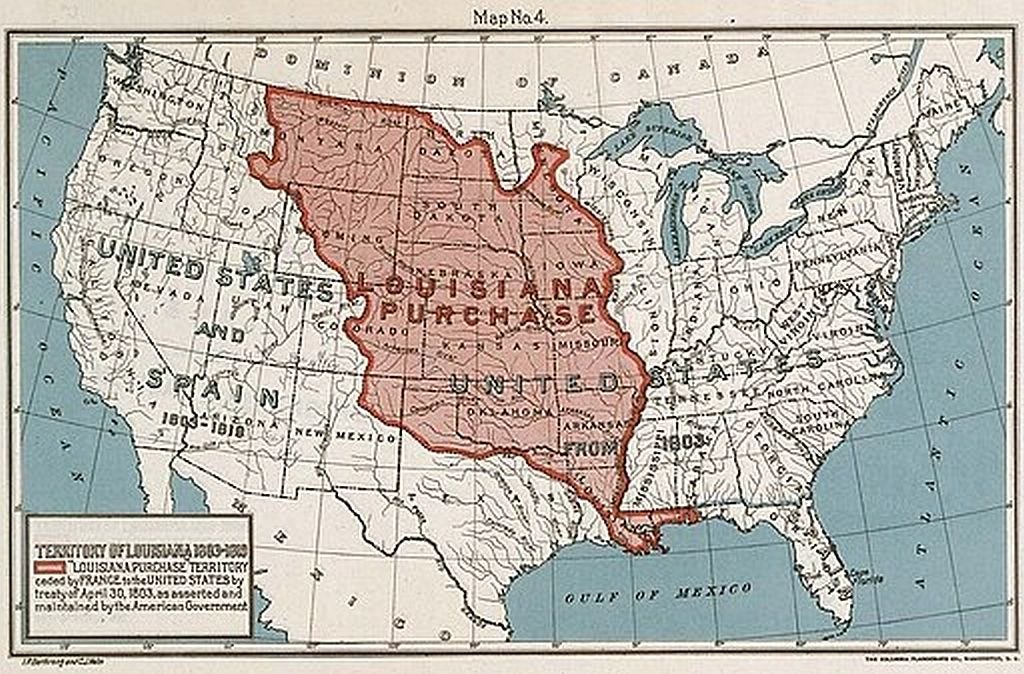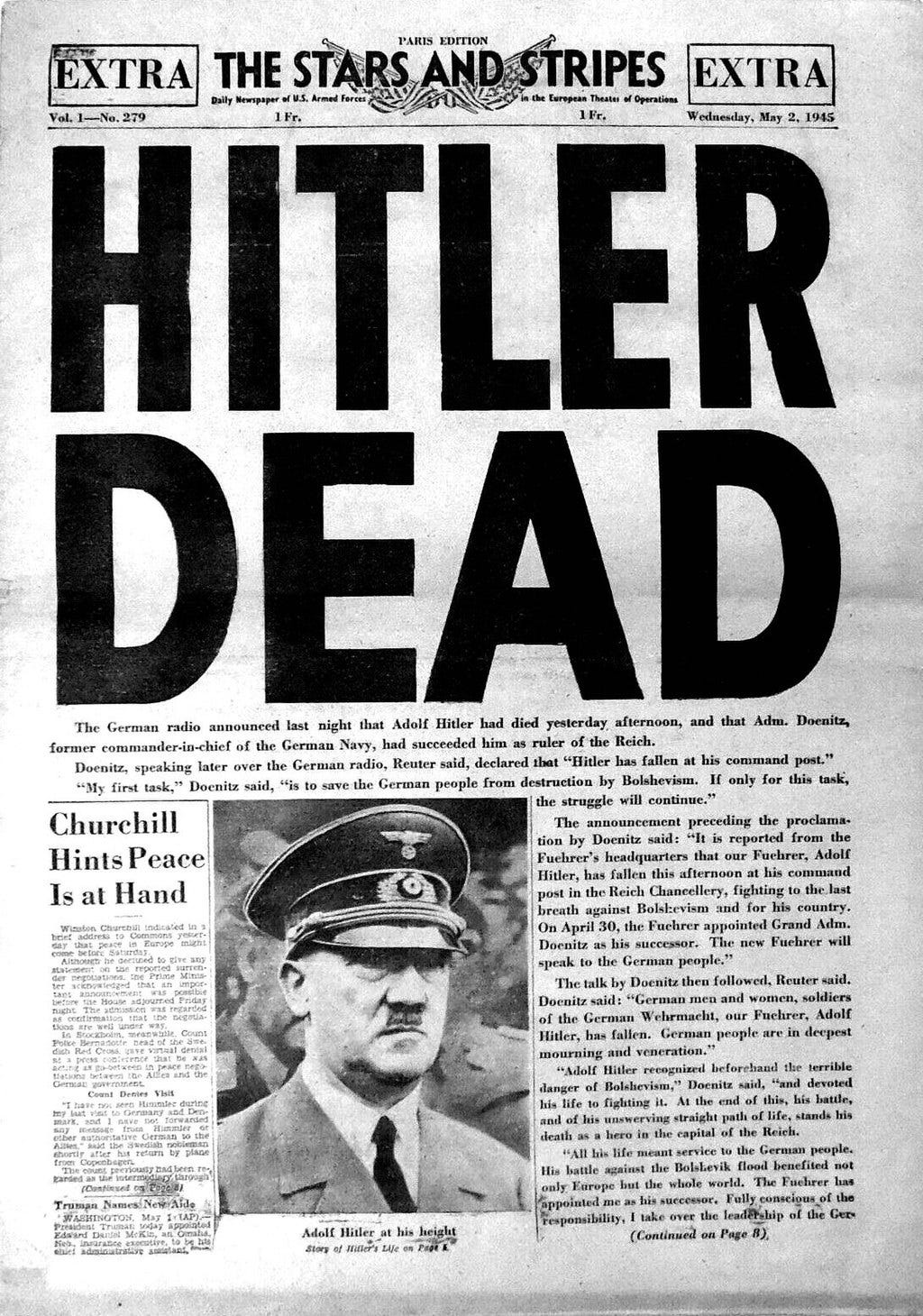The Mysteries of History (April 30 Edition)
First Inaugural Address; Louisiana Purchase; Hitler Kills Himself; Saigon Falls; WWW
1789 — First U.S. Presidential Address
public domain image from wikimedia commons
The following is what I wrote about George Washington’s inauguration in my book Still Casting Shadows: A Shared Mosaic of U.S. History — Volume 1: 1620-1913:
After the Constitution officially went into effect on March 4th of this year, George Washington was voted the first President of the young country. Actu ally, he was not installed until April 30th, because Congress didn’t get around to counting the ballots until then. Nevertheless, March 4th was the inauguration day until the 20th amendment to the Constitution became effective in 1937, when it was determined that the Presidential reins would henceforth be handed over on January 20th.
Similar to today’s situation, Washington was not voted into office directly by the populace. Rather, the people (albeit not all of them, as only white male landowners had the vote at the time) voted for electors who, in turn, voted for Washington. The nation’s first president then named Thomas Jefferson Secretary of State and Alexander Hamilton Secretary of the Treasury. Jefferson would become the third President of the United States, but only after a tied electoral vote between he and Aaron Burr was broken by the House of Representatives in Jefferson’s favor on the 36th ballot.
Runner-up Burr became Jefferson’s Vice President. That was the way things were done then—Presidential candidates did not run as a team with a pre-selected Vice President, but rather the runner-up for President became Vice President. Burr eventually killed Alexander Hamilton—who had favored Jefferson in the deadlocked election—in a duel in 1804.
In his address, Washington noted the need for a strong Constitution and Bill of Rights. He later remarked that his presidency, as well as the Nation itself, was an experiment.
Questions: How do you think the American Experiment is going? Is the trajectory pointing up or down, and why do you so answer? Do you think the trajectory will change? If so, how and when?
1803 — Louisiana Purchased
public domain image from wikimedia commons
The following is what I wrote about the Louisiana Purchase in my book Still Casting Shadows: A Shared Mosaic of U.S. History — Volume 1: 1620-1913:
Thomas Jefferson’s envoys in Paris, R.L. Livingston and future president James Monroe, were instructed to look into acquiring New Orleans and west ern Florida from France (who had recently acquired it from Spain, who had taken it from the Indians). Livingston and Monroe were surprised when all of what was then called “Louisiana”—a tract of land stretching from the Missis sippi River west to The Rockies, claimed for France in 1682 by La Salle—was offered. The price? Fifteen million dollars for the 565 million acre/90,000 square mile parcel, or approximately 3 cents per acre.
Before concluding that France’s dictator Napoleon was insane for selling at such a rock bottom price, consider his probable reasoning:
1) The British, with whom France was waging a war, would probably take the land away from them anyway, if France were to lose the war (which they did).
2) The sale would strengthen America, thus weakening Britain, who still held out hopes of regaining its former American Colonies.
3) France needed the money to continue prosecution of its war with Britain.
4) One of Napoleon’s armies in the West Indies was having a very tough time of it, and he decided to exit the region entirely, focusing his military efforts on Europe alone.
The tough time Napoleon’s armies were experiencing was in what he called Saint-Domingue (which had been called Hispaniola by Columbus and his men, was renamed Haiti by Jean-Jacques Dessalines after Napoleon’s defeat, and which island is today divided into Haiti on the west and the Dominican Republic on the east), where an uprising by the land’s inhabitants put a ham per on Napoleon’s plans for a further foothold in the hemisphere—which he had hoped would have eventually led to a position of dominance for France there. So it was that the successful rebellion of Haitians against France pushed Napoleon into the decision to give up on his American dream and sell the land he had there to the United States government.
This biggest land sale in history took place on April 3rd, 1803, in Paris, but the ceremony for the formal transferral of land did not take place until almost a year later, on March 9th, 1804. It was not until 1818 and 1819, though, that Britain and Spain, respectively, signed treaties indicating their acknowledgment of America’s title to all the land included in the Purchase.
Among the land acquired—all or part of which was to become the states of Louisiana, Arkansas, Missouri, Iowa, North and South Dakota, Nebraska, and Oklahoma as well as most of what we now call Kansas, Wyoming, Colorado, Montana, and Minnesota—was the area where Albert Lee Benjamin Kollenborn and his wife Alice Gladys Green would be born a little over a century later.
This purchase, although it doubled the size of the United States at the stroke of a pen, did not complete America’s acquisitions. Even to the east, there were lands that America would ultimately own, but did not as of yet. For instance, much of Florida still belonged to Spain. There was also much land off the western slope of The Rockies that was still not controlled by the United States.
On this date 222 years ago, one of the largest real estate transactions of all time was closed. France had only recently gotten the region back from Spain. France was willing to sell the vast tract of land (828,000 square miles) for $15 million (equivalent to $425 million in 2025). Even in “today’s money,” that was quite a bargain, at $513 per square mile! Another way of viewing the cost is by acre: less than three cents then, the equivalent of a measly 85 cents today.
Questions: What if France had been unwilling to sell the region at any price? How would the world be different now (there’s no way of knowing for sure, but what seems the most likely impact on world history)?
1945 — Hitler Proves Himself a Sore Loser
public domain image from wikimedia commons
The following is what I wrote about Hitler’s voluntary departure from life in my book Still Casting Shadows: A Shared Mosaic of U.S. History — Volume 2: 1914-2006:
Throughout America, the news that the war (not called World War II until this year, its last) was finally over caused an outpouring of great emotion. The Iola Register, in its issue of August 14th, reported on the reaction of some in that small Kansas town:
IOLANS BREAK LOOSE. The tension created by three years, eight months and seven days of history’s cruelest war snapped in Iola at 6 p.m. today. Within a matter of minutes following President Truman’s announcement, sirens were screaming and Iola’s streets were jammed with pedestrians and cars, and trucks filled with people bent on giving vent to their joy. The scene was not without its touch of sorrow. An older woman was quietly weeping. She had lost three sons in the war. A younger woman was smiling as she fought back her tears, she now awaits her husband who has never seen their 20-month old son. In contrast to those driving furiously around the square, in anticipation of the end of gas rationing, was Cap Newman marching with stately tread, beating a tom-tom from an oil can.
As the hot war was ending, the cold was beginning. The Soviet Union had started the war aligned with the Axis powers, but after Germany turned on and attacked them, they quit that band of cutthroats and formed an uneasy (and temporary) coalition with the Allies. As the war was ending, the Soviet Union and the United States were maneuvering themselves into positions of power for the post-war world. Probably as a move in this political chess match, hoping to get in on the action and share some of the credit, the Soviet Union declared war on Japan two days after the bombing of Hiroshima and one day before the bombing of Nagasaki. Japan formally surrendered on September 2nd.
Other nations also jumped on the bandwagon. Not unlike the dog who only begins barking and growling and pursuing after the subject of his attention has turned away, in the final months of the war, thirteen countries declared war on Germany.
The shock and awe generated by the atomic bombs that had been expelled from the belly of the Enola Gay crippled Japan not just militarily. Their will to continue fighting was also crushed. The worst war in human history, in terms of lives lost, was finally over. In fact, if keeping score in terms of casualties, World War II was much “greater” than the Great War (World War I). Whereas approximately fourteen million died as a direct result of World War I, an estimated 55–60 million died from World War II.
Within hours of the Japanese surrender, Communist leader Ho Chi Minh proclaimed the independence of his country, naming it the Democratic Republic of Vietnam. Twenty-four years to the day later, in the midst of a war fought there, Minh died.
In September, Pop Shannon’s brother Calvin returned from his overseas stint with the navy. For all intents and purposes, the war was over. Nevertheless, president Harry S. Truman did not officially proclaim an end to the hostilities until the last day of 1946.
Hitler's fever dream of a “1,000-year” Reich lasted only about 1/80th of that stretch. It ended when Hitler both won and lost a duel with himself.
Questions: Who took over Hitler’s role as the head honcho of the Nazis? Who was Admiral Donuts? How did Hitler’s end differ from that of Saddam Hussein? Why did Hitler and Eva Braun one day before they committed suicide? On a scale of -17 to 11, how romantic do you think their honeymoon was?
1975 — Saigon Falls / South Vietnam Surrenders
public domain image from wikimedia commons
The quagmire of Vietnam ended on a desultory note for America and its allies, especially those who had to most directly live with the consequences of a North Vietnamese victory, which led to a communist reunification of the divided Country.
Richard “Tricky Dick” Nixon had promised to continue to support the South Vietnamese, but he was out of office (after committing political suicide) and Congress was in no mood to keep spending good money after bad and sending live boys after dead boys.
With Saigon surrounded by the North Vietnamese forces, the South Vietnamese President resigned, turning over the reins of government to the Vice President, and absquatulated before the collapse of his government was complete and final.
The North Vietnamese Colonel who accepted the surrender from a South Vietnamese General (who had become the head of State after the Vice President had only remained one day in that position) said to the General: “You have nothing to fear. Between Vietnamese there are no victors and no vanquished. Only the Americans have been beaten. If you are patriots, consider this a moment of joy. The war for our country is over.”
Questions: Had there been no Watergate scandal, and Nixon would have remained U.S. President, do you think this would have changed the outcome of the Vietnam War (which they call “The American War”)?
1993 — WWW Launches
public domain image from wikimedia commons
The following is what I wrote about the inception of the Internet as we know it in my book Still Casting Shadows: A Shared Mosaic of U.S. History — Volume 2: 1914-2006:
Spurred on by the cold war, the original intent of the decentralized archi tecture the Internet used (a collection of remote computers connected with one another) was to maintain communications in the event of a catastrophic attack on the United States. In the event that one computer center was destroyed, other computers in the country would automatically detect this, and use an alternate routing plan to relay messages. In this way the Internet (built primarily for defense purposes) could theoretically stay operational even if a large percentage of the country had been destroyed.
The Internet came about indirectly as a result of Sputnik, a little machine just a smidgen larger than a basketball, which was launched October 4th, 1957 by the Soviets. Sputnik set in motion the space age, and, tangentially, the information/cyberspace age. President Dwight Eisenhower embarked on a “crash” program to catch up with the Russians. He set up ARPA (Advanced Research Projects Agency). The space and missile portions of that program were eventually spun off into NASA. ARPA was the Pentagon’s arm for com puter science research and information processing. ARPA built the original Internet prototype.
It is impossible to say exactly what year the Internet became mainstream. Work began on the Internet in the 1960s, but it wasn’t until the 1990s that it achieved mainstream fame and became household terminology. The work that government computer scientists were doing was originally unveiled in 1969, and was called ARPAnet. It was a private computer network linking the U.S. Defense Department with key university researchers and government labora tories. In 1972, another key element of what we now call the Internet was added—email (electronic mail).
As already alluded to, in its initial incarnation, the Internet was only avail able to certain government workers and university personnel. Even if it had been open to public use, the average person would not have been able to make heads or tails out of how to utilize it, or, more specifically, would not have considered the investment of time necessary to learn how to use it a worth while endeavor.
That changed with the advent of browsers, which placed a graphical over lay on top of the previously-used command-line prompts that generated plain text only. The 1990 creation of the World Wide Web set the stage for the Internet becoming user-friendly and useful for the common person. Email and the World Wide Web, “surfed” with browsers, are the two key components of the whole entity which makes up the Internet. By this year, the Internet had become more-or-less mainstream.
According to recent figures, each week the Internet gains 300,000 new users. Even many isolated villages in third-world countries are, or soon will be, wired—or, as is the current trend, connected to the Internet, but not literally wired with literal, physical cables. Wireless Internet (WIFI) is the wave of the present (as of time of writing in early 2006).
The first web page was created by the man who was instrumental in bringing the Internet to the masses (via the “World Wide Web” which he first called Mesh), Tim Berners-Lee (born 1955 in London). The page was about the WWW project itself.
Along with the smartphone to come later, and AI now, the Internet is one of the most transformational or disruptive technological inventions in all of human history. Roughly half the people in the world use the Internet. The average American spends 24 hours online each week.
Questions: Were you alive prior to the Internet as we know it (The World Wide Web) bursting onto the scene? If no, can you imagine life without it? If yes, how long did it take you to “get on the bandwagon”? Do you think we are ultimately better off because of having the Internet? Same question for cellphones/smartphones.
Read about “The Secret Lives of Kids” here.











